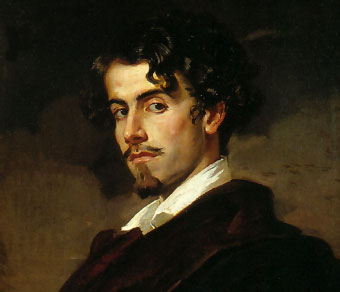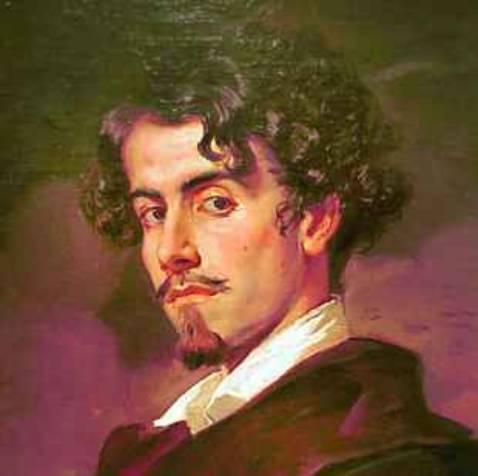Gustavo Adolfo Bécquer
Gustavo Adolfo Domínguez Bastida (better known as Gustavo Adolfo Becquer, born February 17, 1836 in Seville, † December 22, 1870 in Madrid) is one of the most famous writers of the Spanish romance.
Life
At the age of five years Becquer loses his mother, Joaquina de la Bastida y Vargas, who leaves behind eight orphans. Less than five years later dies and his father, Jose Dominguez Becquer, Seville a very well known and respected painter who has already the stage name Becquer (allegedly Flemish origin ) was used, under which the son then you should also operate. He is taken in by his godmother, and until 1854 he lives in Sevilla.
He opts for a study of literature and tried his luck in the capital Madrid. Already in those years he published articles in local newspapers and magazines. Nevertheless, remains of a success. To earn money, he writes for the " Dirección de Bienes Nacionales ", but will soon dismissed when caught him his superior while drawing some scenes from Shakespeare's works. In 1858, he keeps himself in Seville, where he can not perform your job due to tuberculosis or syphilis. During this time, his relationship strengthens his brother Valeriano, who had become a painter like his father. 1861 married Gustavo Adolfo; the marriage, had two children, but is unhappy, and she separated. From 1864-1868 Becquer works as Romanzensor, he gives negligent way and must therefore take criticism. With only 34 years, he died in Madrid, where the character of his mysterious illness to date is undetermined.
Work
Although Becquer lived at a time in which in Spain realism has prevailed, his works still Romanticism be assigned. Most of his works were published posthumously by friends, and so Becquer his life was little known. With his romantic poetry reached in a time in which she was already passé in the rest of Europe, their late peak. In his poems, which are influenced by Heinrich Heine, located Becquer turns to a reflected sense of language; he has made the development of Spanish poetry of modernity towards Juan Ramón Jiménez and Antonio Machado at all possible.
His most famous works are " rhymes " ( Rimas ) and " Legends" ( Leyendas ). Often both parts will be published in collected editions.
Rimas
From the simple rhymes poems called Bécquers that have made him immortal, only 15 published during his lifetime, in various newspapers such as El Contemporáneo, Museo El Universal and La Ilustración de Madrid. In the riots of September Revolution of 1868 the manuscript was lost and had to be reconstructed by the author with the help of friends, but this second manuscript, called Libro de los gorriones (Book of Sparrows ), was lost and found again until 1914. Today, it is kept in the National Library of Madrid. Only posthumously gave friends of the deceased Rimas y Leyendas the two volumes out, especially to the widow from economic difficulties to help. The original poems were supplemented with the term for another; in the output of Colección Austral, they comprise 76
The poems exude simplicity and ease out and focus to the love theme, but there are " revised feelings," ideas about feelings. The lyric I looking for the absolute and impossible, therefore, Becquer also " poeta del amor desesperado " ( poet of impossible love ) called; the basic underlying mood is consistently melancholy. Contrary to the title, it is not consistently rhymed poetry, but the assonance is increasingly replacing the rhyme. The language Bécquers is free of rhetoric and pathos, contrary to the otherwise prevailing in the Spanish romantic tendency to exuberant, this is different from that of his poetry about José de Espronceda.
Leyendas
The (depending on edition ) 18-22 prose legends exude a spooky atmosphere and remind you of ETA Hoffmann; Becquer proven to be an excellent novelist and as a precursor of fantastic literature. It is consistently to " outrageous events ", often with horror effects; Topic is the mysterious, unexplainable, the author presents a psychological concern about the phenomena of madness, anxiety, neurotic obsession of the day. The lyrics are written in poetic prose, in a dreamlike atmosphere, in the tradition of horror romantic. Often they are also embedded in the framework narratives.
The Leyendas include the following legends:
- El caudillo de las manos rojas, 1858.
- . La vuelta del combate, 1858 (cont'd: El caudillo de las manos rojas ).
- La cruz del diablo, 1860.
- La ajorca de oro, 1861.
- El monte de las animas, 1861.
- Los ojos verdes, 1861.
- Maese Perez, el organista, 1861.
- Creed en Dios, 1862.
- El rayo de luna, 1862.
- El Miserere, 1862.
- Tres fechas, 1862.
- El Cristo de la calavera, 1862.
- El gnomo, 1863.
- La Cueva de la mora, 1863.
- La promesa, 1863.
- La blanca corza, 1863.
- El beso, 1863.
- La Rosa de Pasión, 1864.
- La creación, 1861.
- ¡ It raro! , 1861.
- El Aderezo de las esmeraldas, 1862.
- La venta de los gatos, 1862.
- Apólogo, 1863.
- Un boceto del natural, 1863.
- Un lance pesado.
- Memorias de un pavo, 1865.
- Las hojas secas.
- Historia de una mariposa y una araña.
- La voz del silencio, 1923 Released by Fernando Iglesias Figueroa.
- La fe salva, 1923 Released by Fernando Iglesias Figueroa.
- La mujer de piedra, Unfinished.
- Amores prohibidos.
- El rey Alberto.
German editions
- The poet, love, loneliness, death: poems; Spanish and German = El poeta, el amor, la soledad, la muerte. Introduction and transfer of Peter Becker. 2nd, revised. Edition. Dusseldorf: Maple -Verlag, 2006, ISBN 978-3-00-018984-5, ISBN 3-00-018984- X.
- The Devil Cross: eerie legends. [ From the chip. by Kristina herring. Edited by Rainer Silesians ] Leipzig: Dieterich, 1990 ( collection Dieterich, Vol 411) ISBN 3-7350-0057-6
- La ajorca de oro. / The golden bracelet. Legends. Reclam, 1987 ( Spanish / German ). ISBN 978-3-1500-8398-7
- The green eyes: Fantasy Pieces. Translated from Spanish by Fritz Vogelsang. Frankfurt / Main; Berlin; Vienna: Ullsteinhaus, 1984 ( Ullsteinhaus Book, No. 39086: Klett - Cotta in Ullstein Paperback ). ISBN 3-548-39086-2










